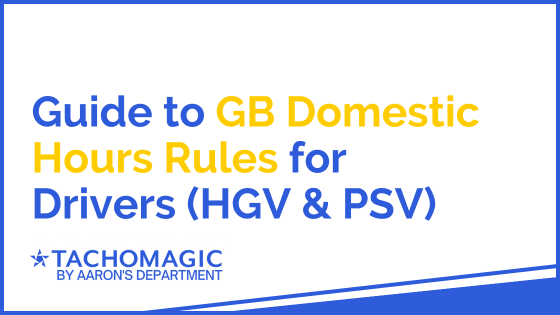An understanding of GB domestic hours rules is essential for anyone involved in road transport in the UK. These are the regulations that must be followed when driving "Out of Scope" of EU Drivers' Hours regulations. Northern Ireland follows a different set of domestic rules to the rest of the UK, which you can read up on here.
There are different sets of rules for HGVs and PSVs, we'll cover both on this page, but starting with HGVs.
Table of Contents
HGV GB Domestic Rules Explained
The domestic hours rules apply to most goods vehicles not exceeding 3.5 tonnes and are driven in connection with a trade or business on public roads. These rules are distinct from EU regulations and are specifically tailored to GB operations (excluding NI).
HGV Daily Driving Limits
Under British domestic driving hours rules, the following applies:
Daily Driving Limit:
The UK domestic driving hours limit is 10 hours per day on public roads.
Duty Limit:
Maximum of 11 hours on duty per day, except when not driving for more than 4 hours. Driving off-road or on private roads for the purposes of agriculture, forestry, quarrying, construction, and civil engineering are all considered to be duty time, not driving time.
This limit doesn't apply on days when no driving takes place.
Duty Time Definition
Under GB domestic rules, the definition of the term "Duty Time" needs extra clarification, depending on the structure of your employment.
Employee Drivers:
Duty time includes all time spent working for the employer, excluding rest and breaks.
Owner Drivers:
Duty time encompasses driving related to the business and any other work related to the vehicle or its load.

Exemptions from HGV Domestic Hours Rules
Daily Duty Limit Exemptions
Drivers of vehicles weighing less than 3.5 tonnes are exempt from the 11-hour daily duty limit if the vehicle is being used for:
- Doctor, dentist, or midwife work.
- Veterinary work.
- Inspection, cleaning, or maintenance work.
- Carrying goods for the sole purpose of soliciting orders (commercial travellers).
- Work carried out by the AA, the RAC, or the RSAC.
- Cinematography, or broadcasting for TV or radio.
Exemptions to all HGV Domestic Hours Rules
Emergencies
Domestic driver's hours rules can be suspended in emergencies to prevent danger to life or health, or to prevent serious disruption of essential services.
Private Driving
Vehicle use outside of work is not considered under domestic hours rules.
Non-public Roads
Driving that takes place off-road, or on private roads, is not considered under domestic hours rules.
Military & Emergency Services
Vehicles that are in use by the armed forces, the police, or the fire brigade (not medical services however!) are exempt from GB domestic hours rules.
Are there exemptions in the GB domestic rules for van drivers?
No, van drivers have no special exemptions. They must follow the rules as laid out for HGVs or PSVs, depending on the role the van is fulfilling.
HGV GB Domestic Rules and Working Time Directive Rules
It may surprise you to learn that there is no overlap in HGV GB domestic driving rules and the WTD. To get a quick breakdown of the WTD's requirements, click here. You'll notice that none of the WTD's limits conflict with the UK's domestic hours rules.
As a result, you'll still have to comply with both sets of regulations. There are no exemptions from the UK's Working Time Directive.

PSV Domestic Hours Rules
HGVs and PSVs must follow different versions of the GB domestic hours rules, with the main difference being additional rules relating to break and rest periods that apply to PSVs. Below, we'll provide a summary of the PSV ruleset.
Duty Time
PSV Drivers must not drive for more than 10 hours per working day.
For Drivers employed by an organisation, duty time is any & all working time. For self-employed drivers, duty time is any time spent driving your PSV or doing any other work relating to the vehicle or its passengers/load/cargo.
Length of Working Day ("Spreadover")
PSV Drivers must not work shifts longer than 16 hours from start to finish. This includes non-driving times.
Driving Breaks
The domestic driving hours breaks rules are slightly stricter than the Working Time Directive when it comes to PSVs, which means they take precedence where there's any overlap.
- If a Driver's total daily work is less than 8.5 hours per day, a break must be taken after 5.5 hours of continuous driving (to be clear, the '.5' refers to 30 minutes!). This break must be at leat 30 minutes long.
- If a Driver works for more than 8.5 hours per day, they must not drive for more than 7 hours and 45 mins during this time. They must also take breaks that add up to 45 minutes in total.
- Drivers must also take an extra 30-minute break in addition to the 45 minutes. This must take place after working for 8.5 hours, but it cannot be taken immediately before the shift ends.
Rest Periods
PSV Drivers must have a minimum 10-hour rest before the first shift and immediately after the last shift in a working week.
A minimum 10-hour rest must be taken in-between every 2 consecutive working days. This can be reduced to 8.5 hours up to 3 times per week. Weeks are fixed from 00:00 on Monday to 23:59 on Sunday.
Exemptions from PSV Domestic Hours Rules
PSV Drivers are exempt from GB domestic hours rules on weeks when less than 4 hours of driving per day takes place. Drivers are also exempt when they are dealing with emergencies (major service disruptions, or threats to life/health).
If more than 4 hours of driving takes place on up to 2 days in one week, Drivers are exempt from certain rules. Drivers must:
- Follow the rules on daily driving limits and the length of the working day, as normal.
- Start and finish all duties within a 24-hour period.
- Take a minimum 10-hour rest before the first duty of the week, and immediately after the last duty.
This means that the main exemption here is from break rules, which do not need to be followed.
For overnight workers, the rules that applied at the start of the shift must be followed until the end. Rules cannot be changed halfway through a shift.
Record Keeping
Detailed record-keeping is required in order to ensure compliance with GB domestic driving rules. Working and driving hours must be recorded on a weekly record sheet, or using a tachograph.
Tachographs are an optimal choice to use in many ways, since they automatically record driving time, and prompt the driver to enter a thorough record of their activities. However, they are more expensive and more complicated to use than a weekly record sheet.
On a tachograph, any driving designated as 'Out Of Scope' of EU Drivers' Hours regulations will be recorded as Other Work, not Driving. The Driver must apply this designation themselves at the start of their shift.
It is recommended to retain these records for a minimum of two years, since they may be used as evidence for compliance with the WTD during official investigations.

Summary: GB Domestic Hours Rules
If you're driving Out-of-Scope of the EU's Drivers' Hours regulations, these are the rules you'll have to follow instead. It pays to familiarise yourself with them, as failure to comply can land Drivers and employers with fines and other penalties.
Further Reading:
If you've found our page "Guide to GB Domestic Hours Rules for Drivers" useful, you may also enjoy the following posts:
- How long should you keep tacho records for?
- Guide to split daily rest
- Guide to WTD breaks
About The Author

Simon Theaker
Simon has over 20 years of dealing with tachograph analysis, and the technologies involved.
His in-depth knowledge and hands-on experience have made him a key behind-the-scenes member of the TachoMagic team.
Through his blogs, Simon hopes to make the lives of Fleet Managers easier, as he shares the answers to some of the most common questions he has received.

